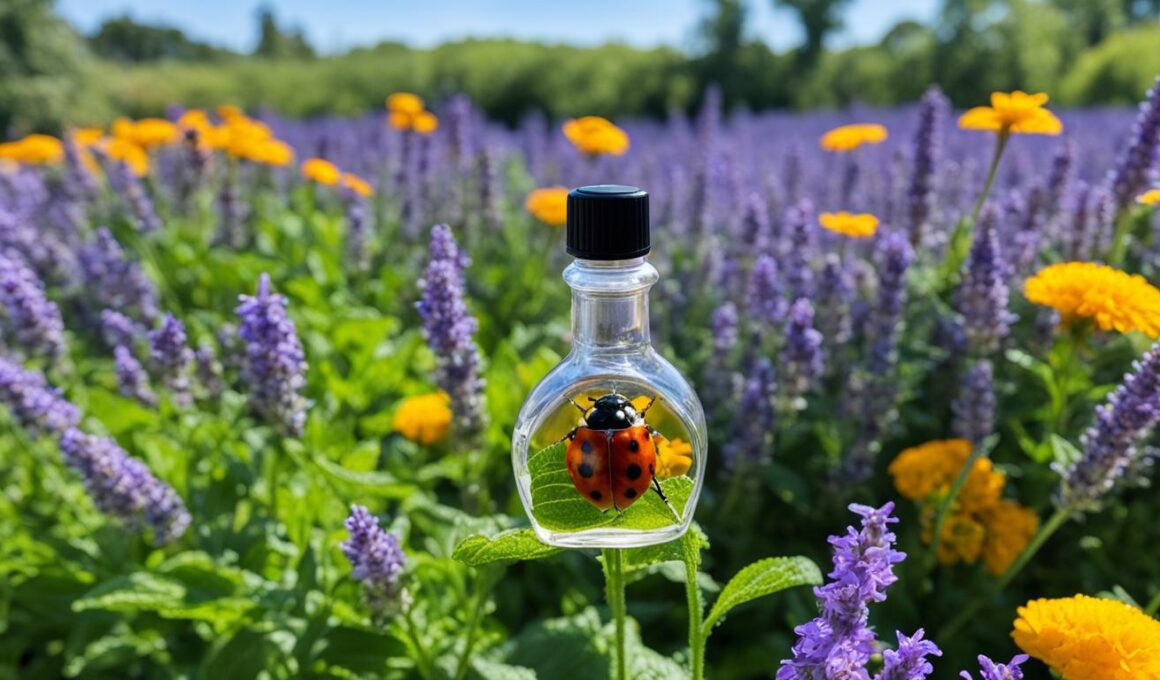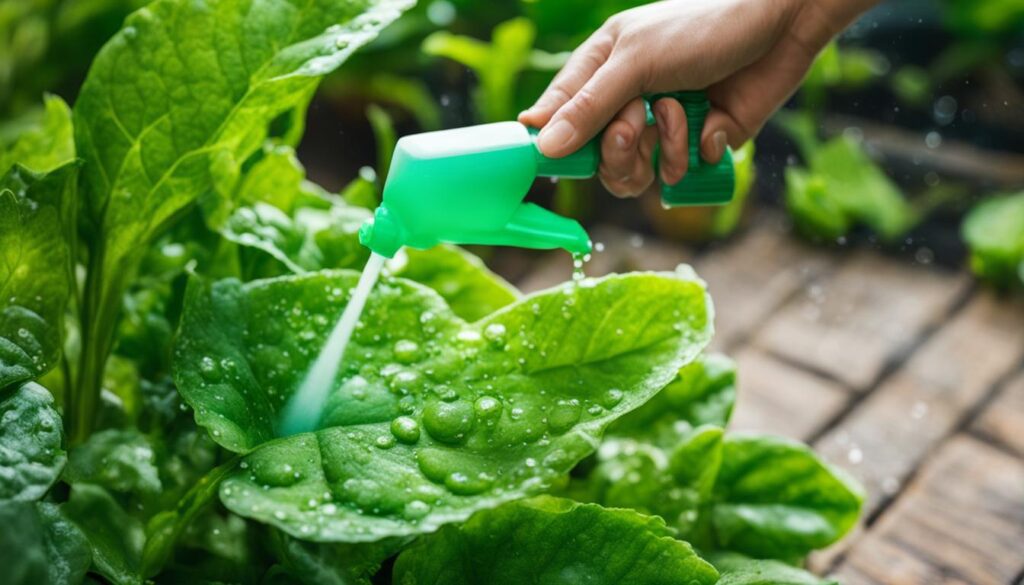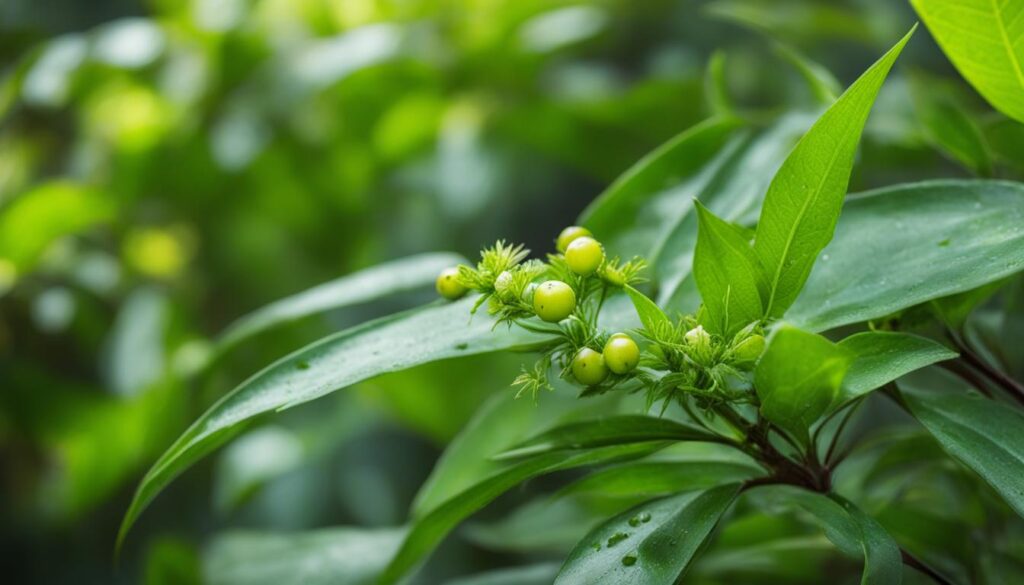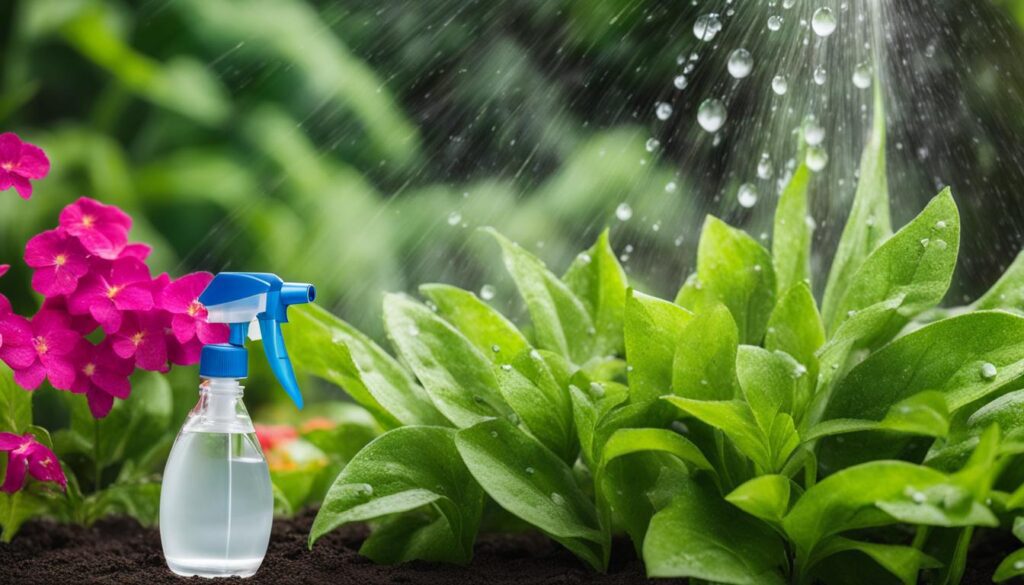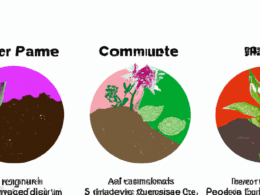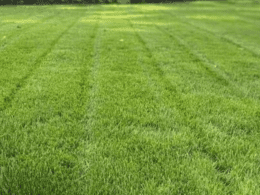Are pests wreaking havoc on your garden? Don’t worry, we have the perfect solution for you. In this article, we will explore natural plant bug killer solutions that will not only protect your plants but also promote a healthy garden ecosystem. Say goodbye to harmful chemicals and embrace sustainable gardening practices with these natural insecticides.
Homemade insect sprays and deterrents are a sustainable and effective way to combat pests while maintaining a healthy garden. These homemade bug sprays, such as insecticidal soap, neem oil bug spray, vinegar spray, garlic spray, tomato leaf spray, cinnamon spray, and other natural remedies, are safe for the environment, pets, and beneficial insects.
Key Takeaways:
- Natural plant bug killer solutions are a safe and eco-friendly approach to pest control.
- Homemade insect sprays like insecticidal soap, neem oil bug spray, vinegar spray, garlic spray, tomato leaf spray, and cinnamon spray can effectively repel and eliminate pests.
- Using natural insecticides helps maintain a healthy garden ecosystem and protects beneficial insects.
- Incorporating companion planting, plant diversity, and preventative measures further promotes a thriving garden with fewer pest issues.
- Embrace sustainable gardening practices and enjoy a pest-free environment for your plants.
Homemade Insecticidal Soap
If you’re looking for a natural and effective way to control aphids and other pests in your garden, homemade insecticidal soap is a great solution. This homemade bug spray is made from simple ingredients that you may already have in your kitchen. It is safe for your plants, pets, and the environment.
To make your homemade insecticidal soap, you’ll need:
- 1 cup of vegetable oil
- 1 tablespoon of dishwashing soap or Castile liquid soap
- Water to dilute the mixture
Combine the vegetable oil and dishwashing soap in a container, and mix well. Then, dilute the mixture with water, and transfer it to a spray bottle. Make sure to shake the bottle before each use to ensure that the ingredients are well mixed.
To use the insecticidal soap, spray it directly on the affected plants, focusing on the areas where you see the pests. The soap will suffocate the pests and help control their population. It’s best to apply the spray in the early morning or late afternoon when the sun is not too harsh to avoid leaf burn.
Tips for Using Homemade Insecticidal Soap
Here are some tips to help you get the most out of your homemade insecticidal soap:
- Test the spray on a small part of the plant before applying it to the whole plant to ensure that there won’t be any negative effects.
- Apply the spray on a calm and wind-free day to prevent it from drifting and causing harm to beneficial insects or neighboring plants.
- Reapply the insecticidal soap every few days or after rainfall to maintain its effectiveness.
- Store the unused spray in a cool and dark place to prolong its shelf life.
Using homemade insecticidal soap is an affordable and eco-friendly way to control aphids and protect your plants. Give it a try and see the difference it can make in your garden!
Neem Oil Bug Spray
Neem oil is a powerful organic insecticide that has been used for centuries in India. It is derived from the seeds of the neem tree and has proven to be effective against a wide range of garden pests. Neem oil works by disrupting the feeding and reproductive cycles of insects, making it an excellent choice for pest control.
Neem oil is not only a natural insecticide but also a natural fungicide, making it a versatile solution for gardeners. It can help prevent and control fungal diseases such as powdery mildew, black spot, and rust. By using neem oil, you can protect your plants from both pests and diseases, ensuring their overall health and vitality.
To make neem oil bug spray, simply mix pure, cold-pressed neem oil with water and a small amount of dish soap. The dish soap helps the solution adhere to the plant foliage. Once mixed, transfer the solution to a spray bottle and apply it generously to the affected plants. Neem oil is safe for pets, birds, and beneficial insects, making it an environmentally friendly choice for pest control in your garden.
The Benefits of Neem Oil Bug Spray:
- Organic and natural insecticide
- Effective against a wide range of garden pests
- Can also control fungal diseases
- Safe for pets, birds, and beneficial insects
- Environmentally friendly
Using neem oil bug spray is a sustainable and effective way to protect your plants from pests and diseases without harming the environment or beneficial insects. Its versatility and safety make it a valuable tool in organic gardening.
Table: Comparison of Neem Oil Bug Spray with Other Natural Pest Control Methods
| Pest Control Method | Effectiveness | Environmental Impact | Safety for Beneficial Insects |
|---|---|---|---|
| Neem Oil Bug Spray | High | Low | Safe |
| Insecticidal Soap | Medium | Low | Safe |
| Vinegar Spray | Low | High | Safe |
| Garlic Spray | Medium | Low | Safe |
| Tomato Leaf Spray | Medium | Low | Safe |
| Cinnamon Spray | Low | High | Safe |
Vinegar Spray
Vinegar spray is a simple and effective natural bug repellent that can help control a wide range of garden pests, including whiteflies, aphids, and ants. This easy-to-make homemade solution is a safer alternative to chemical pesticides, as it is non-toxic to humans, pets, and beneficial insects. Vinegar spray is also an eco-friendly choice, as it does not harm the environment or contaminate water sources.
To create vinegar spray, combine one cup of white vinegar with three cups of water in a spray bottle. Adding a small amount of dishwashing soap can help the solution adhere to the plant foliage. Shake the bottle well to mix the ingredients thoroughly. Then, spray the mixture directly onto the affected plants, focusing on the undersides of leaves where pests tend to hide.
Tip: To reduce the strong smell of vinegar, you can add a few drops of essential oil or lemon peel to the mixture. This will not only help mask the odor but also provide additional pest-repelling properties.
Garlic Spray
To naturally control aphids and protect your plants, try making your own garlic spray. Garlic spray is a potent homemade insect repellent that can effectively deter aphids, slugs, and carrot flies, among other pests. Utilizing the natural properties of garlic, this spray is a safe and organic alternative to chemical pesticides.
To make garlic spray, start by pureeing two garlic bulbs with vegetable oil. Let the mixture sit overnight to allow the ingredients to infuse. Next, strain the liquid and add liquid soap and water to dilute the solution. Store the garlic spray in the refrigerator for future use.
When you notice aphids or other pests on your plants, simply spray the garlic mixture on the leaves of the infested plants. Be sure to cover both the tops and bottoms of the leaves to ensure thorough coverage. Reapply as needed or after rain to maintain the effectiveness of the spray.
Companion Planting with Garlic
In addition to using garlic spray, consider incorporating companion planting with garlic to naturally repel pests. Garlic is known to deter a wide range of insects, making it an excellent companion plant for susceptible crops.
When planting your garden, strategically place garlic alongside crops that are prone to aphids or other common pests. The strong scent of garlic acts as a natural deterrent, reducing the risk of insect infestations. Additionally, garlic itself is a versatile and tasty addition to your garden, providing both pest control benefits and culinary use.
| Pests Controlled | Application Frequency | Effectiveness |
|---|---|---|
| Aphids | As needed or after rain | High |
| Slugs | As needed or after rain | Moderate |
| Carrot Flies | As needed or after rain | Moderate |
“Garlic spray is a natural and organic solution for aphid control. It’s easy to make and safe to use, making it an ideal choice for gardeners seeking eco-friendly pest control methods.” – Gardening Enthusiast
Tomato Leaf Spray: Natural Mite Control for Organic Gardening
Tomato leaf spray is a popular natural insecticide that can effectively control mites in your garden. Mites are tiny pests that can wreak havoc on your plants by sucking sap from the leaves and causing damage. By using tomato leaf spray, you can protect your plants from mite infestations without resorting to harmful chemical pesticides.
To make tomato leaf spray, simply soak chopped tomato leaves in water overnight, strain the liquid, and transfer it into a spray bottle. Then, apply the spray directly to the affected plants, making sure to cover both the upper and lower surfaces of the leaves. The alkaloids in tomato leaves act as a natural deterrent to mites, effectively controlling their population and preventing further damage.
Using tomato leaf spray not only helps control mites but also promotes organic gardening practices. By avoiding synthetic pesticides, you can create a healthier and more sustainable garden environment. Additionally, tomato plants naturally produce chemicals that repel insects, making them a valuable addition to any garden.
Benefits of Tomato Leaf Spray
- Effective mite control: Tomato leaf spray is proven to be an effective natural remedy for mite infestations.
- Organic gardening: By using tomato leaf spray, you can maintain an organic garden free from harmful chemicals.
- Eco-friendly solution: Tomato leaf spray is safe for the environment, beneficial insects, and pets.
- Cost-effective: Making tomato leaf spray at home is a budget-friendly option compared to store-bought pesticides.
- Sustainable pest control: Incorporating tomato leaf spray into your garden routine helps reduce reliance on synthetic pesticides.
By harnessing the power of tomato leaves, you can protect your plants from mite damage while promoting a sustainable and eco-friendly approach to gardening. Give tomato leaf spray a try and enjoy a thriving, mite-free garden.
Cinnamon Spray
If you’re looking for a natural ant repellent to keep your garden free from these pesky insects, cinnamon spray is a fantastic organic pest control solution. Cinnamon has properties that repel ants and prevent mushroom growth, making it an ideal option for those seeking a safe and effective alternative to chemical pesticides. Creating your own cinnamon spray is simple and can provide a natural defense against ant invasions in your garden.
Cinnamon Spray Recipe
To make cinnamon spray, follow these easy steps:
- In a spray bottle, mix cinnamon powder with warm water.
- Let the mixture steep overnight for maximum potency.
- Strain the mixture to remove any large particles.
- Mist the potting soil and plants with the cinnamon spray.
The strong scent of cinnamon will deter ants and discourage them from invading your garden. Additionally, the spray can help prevent the growth of mushrooms, keeping your garden healthy and vibrant.
If you’re tired of dealing with ants in your garden, try using cinnamon spray as a natural ant repellent. Not only will it keep these pests at bay, but it’s also an environmentally friendly option that won’t harm beneficial insects or the ecosystem of your garden.
What Are the Best Natural Plant Bug Killer Solutions for Healthy Gardens?
Looking for the best natural plant bug killer solutions to protect your greenery today? Try using neem oil, garlic spray, or insecticidal soap to keep pests at bay. These organic methods are safe for your plants and effective in controlling pests without harming the environment.
Conclusion
When it comes to pest control in your garden, natural solutions are the way to go. By using homemade bug sprays and other remedies, you can effectively repel and eliminate pests without harming the environment, pets, or beneficial insects. This approach to natural pest control is not only sustainable but also promotes a healthy garden ecosystem.
Homemade insecticidal soap, neem oil bug spray, vinegar spray, garlic spray, tomato leaf spray, and cinnamon spray are all effective options for controlling pests in your garden. These homemade bug sprays are made from natural ingredients and are safe for both the environment and your plants. They can help you achieve a garden that is free from unwanted pests.
In addition to using homemade bug sprays, it’s also important to incorporate companion planting, plant diversity, and preventative measures into your gardening practices. These strategies can further promote a healthy garden ecosystem, making it less susceptible to pest issues. By taking a holistic and sustainable approach to gardening, you can enjoy a thriving garden that is both beautiful and pest-free.
So, ditch the chemical pesticides and opt for natural pest control methods. Embrace sustainable gardening practices, make your own homemade bug sprays, and create a garden that is safe, healthy, and thriving. With these natural pest control solutions, you can maintain a beautiful garden that you can be proud of.
FAQ
Are homemade insect sprays effective against pests?
Yes, homemade insect sprays, such as insecticidal soap, neem oil bug spray, vinegar spray, garlic spray, tomato leaf spray, cinnamon spray, and other natural remedies can effectively repel and eliminate pests like aphids, mites, thrips, and more.
Are homemade bug sprays safe for the environment and pets?
Yes, homemade bug sprays are safe for the environment, pets, and beneficial insects. They are made from natural ingredients and do not contain harmful chemicals that can harm the ecosystem.
How do I make insecticidal soap?
To make insecticidal soap, mix one cup of vegetable oil with one tablespoon of dishwashing soap or Castile liquid soap. Dilute the mixture with water and spray it on the affected plants. Avoid using soap sprays in the heat of the day to prevent leaf burn.
How do I make neem oil bug spray?
To make neem oil bug spray, mix pure, cold-pressed neem oil with water and optional dish soap. Apply the solution to the plant foliage. Neem oil is safe for pets, birds, and beneficial insects.
How do I make vinegar spray?
Mix one cup of white vinegar with three cups of water and add a small amount of dishwashing soap to help the solution adhere. Spray the mixture directly on the affected plants. Vinegar spray is effective against a wide range of garden pests and can also repel ants.
How do I make garlic spray?
To make garlic spray, puree two garlic bulbs with vegetable oil, let it sit overnight, strain, and add liquid soap and water. Store the mixture in the fridge and spray it on the leaves of infested plants. Garlic is also known to be a companion plant that repels pests.
How do I make tomato leaf spray?
Soak chopped tomato leaves in water overnight, strain the liquid, and spray it on the plants. Tomato leaves can be recycled and used as a spray after pruning. Tomato plants are known for their characteristic scent, which can repel insects and help protect the plants.
How do I make cinnamon spray?
Mix cinnamon powder with warm water, let it steep overnight, strain, and pour it into a spray bottle. Mist the potting soil and plants to repel ants and prevent mushroom growth. Cinnamon is a natural and safe alternative to chemical pesticides.
Why should I use natural plant bug killer solutions?
Using natural plant bug killer solutions is a sustainable and eco-friendly approach to pest control in your garden. They effectively repel and eliminate pests without harming the environment, pets, or beneficial insects.
How can I promote a healthy garden ecosystem with fewer pest issues?
Incorporating companion planting, plant diversity, and preventative measures can further promote a healthy garden ecosystem with fewer pest issues. Protect your plants naturally and enjoy a thriving garden.





